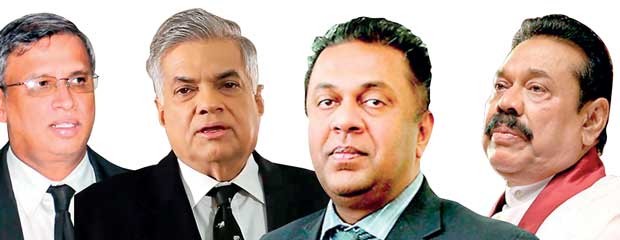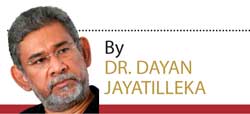Reply To:
Name - Reply Comment

 With every major step it takes in every important direction, the Wickremesinghe- administration seems to run into difficulty, losing popularity and social legitimacy. The further it goes on any front, the narrower its social support becomes. To put it more simply, with every step it takes, fewer people seem to go along with the Government while more people seem to dissent. Overall there is a palpable sense of discontent and dismay. What is the reason for this apparent erosion?
With every major step it takes in every important direction, the Wickremesinghe- administration seems to run into difficulty, losing popularity and social legitimacy. The further it goes on any front, the narrower its social support becomes. To put it more simply, with every step it takes, fewer people seem to go along with the Government while more people seem to dissent. Overall there is a palpable sense of discontent and dismay. What is the reason for this apparent erosion?
An answer may reside in a remark made the other day by Prime Minister Wickremesinghe at the Colombo conference of the Asian section of the International Democratic Union, the global network of Rightist and Centre-Right parties that Mr. Wickremesinghe affiliated the UNP with, breaking with the practice of his predecessors. Well groomed and in his ideological comfort zone, the PM was relaxed enough to speak his mind.
The TV news showed him saying that “the last decade was negative for Sri Lanka”. Obviously he is not speaking of the second Rajapaksa term. The “last decade” that he speaks of takes us back to 2006. It encompasses the entire Rajapaksa tenure including the hard fought and hard won victory of 2009 which reunified the territory of the island and ushered in a stable peace after thirty years. Of course it also includes the years of rapid de-mining and near-miraculous reconstruction and modernization which eliminated most signs of the long and devastating war and transformed the face of the country.
The PM’s statement shows that he is at odds with the consciousness of most of the citizenry. The fairly narrow electoral victory he obtained in August 2015 shows that most people feel that the first half of the last decade that the PM was writing off i.e. the first Rajapaksa term (encompassing the war years) was positive, though the second was less, or was more bad than good, or was in any case due for a change. Only a microscopic minority would agree with the PM’s sentiment expressed openly at the IDU conclave that “the last decade was bad for Sri Lanka”. That statement alone shows just how out of touch he is with the national consensus.
President JR Jayewardene who had in 1977, a genuinely sweeping mandate of a five sixths majority in Parliament, to radically change the country was mindful of his own bitter experience as Finance Minister in 1952 when his price revisions triggered the Hartal of August ’53. He was also mindful of the country’s ideological consensus and culture. Thus he and Finance Minister Ronnie de Mel avoided economic shock therapy, retained 60 of the economy in the hands of the State, launched State-led development projects such as the Mahaweli, retained the unitary character of the State from the First Republic and even paid lip-service to Socialism in renaming the State.
By contrast, PM Wickremesinghe has chosen to ignore the ideological consensus which has always been centrist and social democratic, and go against the grain of national and public consciousness.
Of course there are those who do share the PM’s perspective that the last decade, including the wartime Rajapaksa-presidency -- rather than just its latter half, the years of the ‘cold peace’-- was negative; was bad. His co-thinkers would be the hardcore Colombo cosmopolitan NGOists as most Tamil nationalist voters and members of the Tamil Diaspora, many in Tamil Nadu and some elements in the West. The PM’s negative verdict on the dramatic last decade of our contemporary history seems shared by ex-President Kumaratunga and Minister of External Affairs Mangala Samaraweera.
The shared mentalities of the PM, Mangala and CBK, have resulted in manifest contradictions within the Jan 8, 2015 coalition. The SLFP has put the brakes on and re-routed the runaway Ranil-CBK-TNA ‘Constitutional Revolution’. The country’s most educated professionals have taken on ECTA.
Constituencies as utterly disparate as the anti-racist radical FSP and non-party rural peasants are in marching mode. The JVP is openly threatening direct action to block ECTA which is widely perceived by its university educated youth constituency as a Trojan horse for “Indian economic expansionism”.
Deadlock looms on the Constitutional front. The SLFP and the Joint Opposition would have to be suicidal to agree to abolish or truncate the Presidency, which would shrink the Maithri counterweight, strengthen the already aggressive incumbent PM and benefit the UNP.
The entire project of Constitutional transformation is flawed in definition and design. Is it to be a totally new system or a structurally modified one? Are the views of the TNA and the Diaspora more important than those of the SLFP? Two recent episodes, all interlocking, demonstrate that the government is headed for a dead-end at best and a minefield at worst. The first episode is that of Maj. Gen. Chagi Gallage, respected wartime commander of an elite fighting formation. A process of reconciliation and transformation which isn’t designed to draw in the large, victorious armed forces as a willing stakeholder, and worse, which seems to marginalize and victimize respected combat commanders and privilege the peace NGO sultanate instead, is fraught, to say the least.
Secondly and finally comes Minister Samaraweera’s Washington declaration that “…we are willing to consider the participation of international actors…They could be Judges, they could be forensic experts, investigators, prosecutors, all these options are being looked at”. The Reuter reports adds that “Samaraweera said the ‘contours and the architecture’ of the court would be worked on in the next five or six months, after consulting with parties including the Tamil National Alliance”.
(http://www.ft.lk/article/527934/Mangala-in-US-says-Sri-Lanka-open-to-international-actors-in-war-crimes-probe#sthash.cVc8H2Jc.dpuf)
If Mangala Samaraweera is unilaterally willing to tout the socially and electorally prohibitive participation of “international actors” in a controversial, polarizing “new court”, he may find that the SLFP, the parliament, and the state itself are willing to reconsider the “participation” of those such as him as “domestic actors”. Mr. Samaraweera may have buddies inside the Beltway but as his Prime Minister learnt the hard way in 2004 when he vainly invoked President George W. Bush, neither State Dept. nor White House officials vote in Sri Lankan elections or are members of its parliament.
These dual episodes reveal the doctrine of the Ranil-CBK-Mangala trio. The doctrinal discourse seems to delude itself that Sri Lanka was ruled by a military junta and that the 2015 elections deposed it. Thus the constitutionally legitimate Sri Lankan military which liberated this democratic country from the excrescence of fascist terrorism is being treated in a far more cavalierly punitive fashion than a former military dictatorship/martial law regime in Spain, Greece, Turkey, Indonesia, Philippines, Bangladesh, Pakistan or the whole of Latin America.
M.A. Sumanthiran, the West’s poster-boy for Tamil moderation, threatens “amputation” of the North and East from Sri Lanka if there is no deep-gouging accountability process with foreign participation: “The participation of international players is absolutely essential…there will be a temptation not to dig too deep because the wound is not completely healed… If not, an amputation might be necessary.” (Walko, ‘Sri Lanka’s Transitional Justice Commitments’, Ground views, Feb 26). He may wind up provoking a Tien An Mien or post-Tahrir II outcome.
The Ranil-Mangala-CBK troika seems to regard the last war as a bad thing, the victory as a crime and “the last decade” as “bad for Sri Lanka”. No wonder it is trying to reverse the results of that historic victory and return us to the previous decade, re-constituting the Package - CFA - PTOMS model of ethnic minoritarian favouritism, centrifugal provincial segmentation and military retrenchment and subservience. The victorious patriotic military is perceived as a dangerous threat, nay, as The Enemy.
Going by Mangala’s statement in Washington DC, there are barely “five or six months” to halt and reverse this dangerous offensive against our sovereignty, our armed forces and our victory in the Long War.